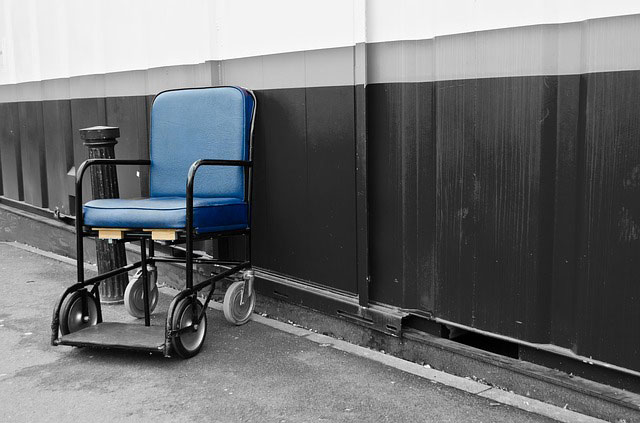Palliative Care: A Helpful Guide (2018)
 Being diagnosed with an incurable illness is a traumatic time, both for the individual concerned and their loved ones.
Being diagnosed with an incurable illness is a traumatic time, both for the individual concerned and their loved ones.
At such an emotional time, it can be hard to focus on getting the care and support you need.
And while the health and social care services should coordinate their intervention to cover your needs, it’s still sensible to research your options and play an active part in the decision-making process.
No package of care is uniform and can depend on a range of factors, from your personal preferences to your local NHS service provision.
Let’s take a look at your choices.
What is Palliative Care?
It can also be for complex illnesses that aren’t necessarily advanced, or for conditions that haven’t received a final diagnosis.
The support specifically addresses health, psychological, emotional, social and spiritual needs.
Everyone facing life-threatening illness needs supportive care, in addition to treatment for their condition. As such, the aim of palliative care is the achievement of the best quality of life for individuals and their families. By employing a holistic approach, providers will take the individual’s wishes and preferences into account, and aim to:
- Keep a person healthy and active as long as possible
- Relieve pain and manage other symptoms
- Offer a support system to help the individual and the family, including the provision of psychological, social and spiritual support and complementary therapies
- Provide end-of-life care for as long as it is needed
Where Does Palliative Care Take Place?
The care can be administered in a variety of settings and depends on your health condition, medical needs and preferences. While some people choose to remain at home with family and friends, others prefer the comfort provided by specialist facilities with an on-site care team. This could be in a care home, hospital or hospice.

Palliative Care for Children and Young People
Families with children and young adults can access a range of palliative care services including:
- advice
- community nursing
- dream or wish fulfilment
- education
- equipment
- holidays and leisure
- information
- therapies
Additionally, children or young adults may be able to access including short breaks, respite care and dedicated hospices around the UK.
Conditions Treated
Palliative care specialists can care for a range of conditions, including:
- Alzheimer’s and Dementia
- Amyotrophic Lateral Sclerosis (ALS)
- Bone Marrow Transplant
- Cancer
- Cardiac Disease
- Chronic Obstructive Pulmonary Disease (COPD)
- Eosinophil Associated Disease (EAD)
- HIV/AIDS
- Huntington’s Disease
- Kidney Disease
- Leukaemia and Lymphoma
- Liver Disease
- Multiple Sclerosis
- Parkinson’s Disease
- Pulmonary Fibrosis
- Sickle Cell Anemia
- Stroke
Symptom Control

These can include:
- Pain, treatments: side-effects and emotional aspects of pain
- Mouth care: how to keep your mouth healthy
- Fatigue: why treatment can cause fatigue and what you can do about it
- Eating problems: illnesses or treatments can cause a range of eating problems
- Breathlessness: causes and treatment
- Support in the last days and hours of life: the principles behind end of life care
Who Are the Professionals Who Will Help?
A wide network of professional and specialist support is provided by:
- Consultants in palliative medicine
- Clinical nurse specialists
- GPs (General Practitioners)
- Community nurses
- Specially-trained nurses
- Social workers
- Care workers
- Spiritual care professionals
- Counsellors
- Allied health professionals: physiotherapists, occupational therapists, complementary therapists
- Dieticians

Integrated teams can provide specialist palliative care services including:
- Assessment, advice and care for patients and families in all care settings, including hospitals and care homes
- Specialist in-patient facilities in hospices and hospitals
- Intensive co-ordinated home support
- Day care facilities
- Advice and support to all people involved in a patient’s care
- Bereavement support services
- Education and training in palliative care
Practical Advice
Your GP, community nurse, home care team, social worker, physiotherapist and specialist nurse can advise on a range of topics, including:
- Advice for partners, carers and friends and acknowledging their feelings
- Being positive and facing up to the situation, and finding ways of coping
- Coping with work, family, living alone, staying safe – avoiding falls
- Denial, information on dealing with denial and acknowledging the changes the illness has caused
- Depression
- Driving: information on driving if you are using strong painkillers
- Emotional effects, coping with and managing uncertainty, isolation, anger
- Equipment
- Finances
- Holidays and travel in the UK and abroad, and helpful hints
- Pain, information on coping with emotions and increased pain
- Spiritual care and ways to look after your own spiritual needs
- Support organisations
Equipment and Aids

Equipment that can help in your activities of daily living may be available on loan from the NHS and delivered to you. Your GP should be able to arrange this or give you the number to contact.
In addition to the NHS, there are other possible sources of equipment:
- Shops and organisations that hire out aids and equipment – look under ‘Disabled’ in the telephone directory or in Yellow Pages;
- The Red Cross
- In Scotland, Telecare Self-Check Online tool
As an example, stairlifts can be rented and fitted discreetly to straight stairs, with attachments to stair treads, and with a width of only 15 inches. You should be able to ask for a free quotation.
Complementary Therapy
Some complementary therapies such as acupuncture, reflexology, aromatherapy, and mindfulness may be provided free of charge in your area.
You may also consider it beneficial to pay for private treatment like massage and aromatherapy to manage your symptoms. Practitioners who specially trained in Cancer Touch Therapy are available to meet such needs, although such interventions should be discussed with your palliative care team first.

Choosing a Palliative Care Provider
Everyone has individual needs and preferences. If you want to stay in your own home where you can retain a feeling of independence and normality, there may be more support from loved ones and less care upheaval.
Your family may live far away and suggest you move closer to them. You may live on your own, which you worry could be more challenging. Alternatively, perhaps you would prefer a facility close to home where friends can visit and healthcare professionals are on hand.
Your preferences are taken into account and you’re an active participant in the care you receive.
The framework for delivery of services can vary in different areas, even in the same county, but there will be a structure in place to help you.
If you wish to stay at home in familiar surroundings, your GP will be your main point of contact, who can organise a range of services.
For example, a specially-trained community nurse, physiotherapist and occupational therapist can visit, in addition to a palliative care team.
You’re might even be offered regular GP appointments and complementary therapies, such as reflexology and mindfulness, and you should have access to certain pieces of equipment that will make things easier for you.
If your circumstances change, and you or your partner need a break, it’s possible that you can have respite care as a temporary measure for a short time. This is sometimes available in a hospice.
Discuss the options with your GP. Ask what’s available and speak to your family. Get clarification as to whether all services are free. Some services may require assessments to clarify whether they’ll be provided at no cost to you.
Although you may already know of an excellent care home or hospice in your area, you can get recommendations from the health professionals managing your case. You or your family might wish to visit the home, read testimonials or refer to the most recent CQC (Care Quality Commission) report.
Check if the care comes with any financial obligations, whether the full fees are payable, or whether aspects of care can be topped up by your own private contribution.
If your condition progresses and you demonstrate greater care needs, some hospitals provide specialist palliative care teams who work alongside medical staff, with access to dedicated rooms for end-of-life care.
Also, check with your GP whether your local hospice will be available for you in the earlier or later stages of end-of-life care. Hospice care could be free of charge.

Palliative Care Cost
Palliative care that is received could, subject to eligibility, be a package that’s arranged and funded by the NHS and is free of charge to the person receiving the care.
The NHS was launched in 1948 to provide free health cover as a basic right to anyone residing in the UK. Today, most NHS services are free of charge to all citizens of the United Kingdom and Northern Ireland.
To take the first steps, speak to your GP and ask if you may be eligible for Continuing or fully Funded NHS Care (in Scotland, Hospital-Based Complex Clinical Care) and if you can organise an assessment.
Alternatively, contact your district or community nurse or call the number your healthcare professional has given you.
Coping Financially
Often there’s a grey area between the healthcare services offered by the NHS and social care services offered by the local council. It doesn’t help that the policy is not clearly defined and can vary between separate areas of the country and different interpretations of the guidelines.
You can ask your GP, hospital doctor or nurse to refer you to a hospital or community social worker for more information about your local situation.
You might be eligible for a package of care that’s arranged and funded by the NHS or you might qualify for special funds or benefits, such as:
- Employment Support Allowance,
- Statutory Sick Pay,
- Carer’s Allowance,
- Attendance Allowance,
- Pension Credit,
- Tax Credits and Child Tax Credits,
- Housing Benefit,
- Council Tax Reduction
Charities
Some charities provide support and potentially grants to help cover some of your costs.
Other Organisations
Other organisations can provide useful financial advice on the following:
- Money and legal matters
- Benefits and Entitlements
- End of life planning
- Financial support
- Benefits and other financial support
- Benefits and financial support
Planning for the future
Although it will be hard, you’ll have to consider the practicalities of your care and prepare for the future. This may include:
- Making an anticipatory care plan
- Preferred priorities for care
- Location and nature of the care
Others could involve:
- Decisions about CPR (cardiopulmonary resuscitation)
- Legal and practical issues
- ‘Just in case’ medicines
- Choosing where to die
- Dying well at home and most recent research via Social Care
- Organ donation
- Marriage
- Asbestos-related compensation claims
We all like to have control over our health and our future. You may find it helps you and others to talk about your condition, your feelings and what’s important to you at this difficult time.

Preparing for Death and Bereavement
You might have your own questions and concerns about end-of-life care, physical changes, psychological support, and what will happen after death.
Further information is available from the NHS in England, Scotland, Wales and Northern Ireland, as well as charities dealing with specific illnesses, palliative care providers, organ donation and Citizens Advice.
Author: Joel Key
Help care workers change lives by becoming a supporter of The Care Workers Charity today. If you’re a caregiver, check if you qualify for support here.
